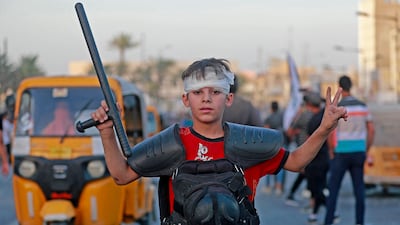Joblessness, corruption and unpaid salaries are just a few of the outward symptoms of Iraq’s ailing economy. The country's condition, however, might be even more strained. Its sovereignty is being eroded by an array of foreign-backed militias. The effects of climate change are already visible. Water shortages abound, causing disasters from failed crops to cholera outbreaks.
Poor governance is commonly the cause of such woes. But for Iraq, the problem is compounded by the lack of agreement on a new government. This week marks one year since politicians failed to form an administration after elections last October. It is a concerning milestone that represents a dangerous malaise at the heart of the country's politics.
In the past few years, violent protests have broken out, terrible dust storms have choked the population and missiles have been launched into its territory by foreign actors. Iraq has few means of responding. A caretaker government is doing its best, but is no replacement for an elected coalition with accountability and legitimacy.
The many crises need urgent action. But Iraq is also missing out on positive opportunities, too, with the huge potential of its energy industry still largely untapped.
It is not as though the parliament has been empty or without drama. In recent months, protesters loyal to the popular cleric Moqtada Al Sadr stormed and occupied the chamber on a number of occasions. Their actions are a potent symbol of the direction in which politics is going in the country.
Looking forward, however underwhelming a new government might be, it would still be better than the violence seen in recent months. The situation is so bad that the priority is no longer just implementing policy. Now it is also about keeping a basic political process alive.
That should motivate politicians to put aside differences and act in the people's interests. A government and working parliament can provide a buffer when social tensions are high and stop today's situation in which violence is the first and only option for groups to express political opinions. Externally, it would mean that the government could put up more of a front against foreign interference, particularly when it comes to Iran-backed militias, which are, perhaps, the biggest single factor in why Iraq still does not have a government after a year. A weak and easy to manipulate Baghdad is a big strategic plus for Tehran and its vision for the region.
With each day that passes without a government, a creeping acceptance mounts that politics can never properly function in Iraq. Accepting this would be a betrayal of Iraqis and the hope that they and the world put into the fledgling democracy and its work-in-progress but laudable 2005 constitution.
That constitution opens with a call to the people of Iraq, describing them as: "The people of Mesopotamia, the homeland of the apostles and prophets, resting place of the virtuous imams, cradle of civilisation, crafters of writing, and home of numeration." This is what is being squandered in 2022. One year without a government is a short time in Iraq's long history, but it is one too many.










